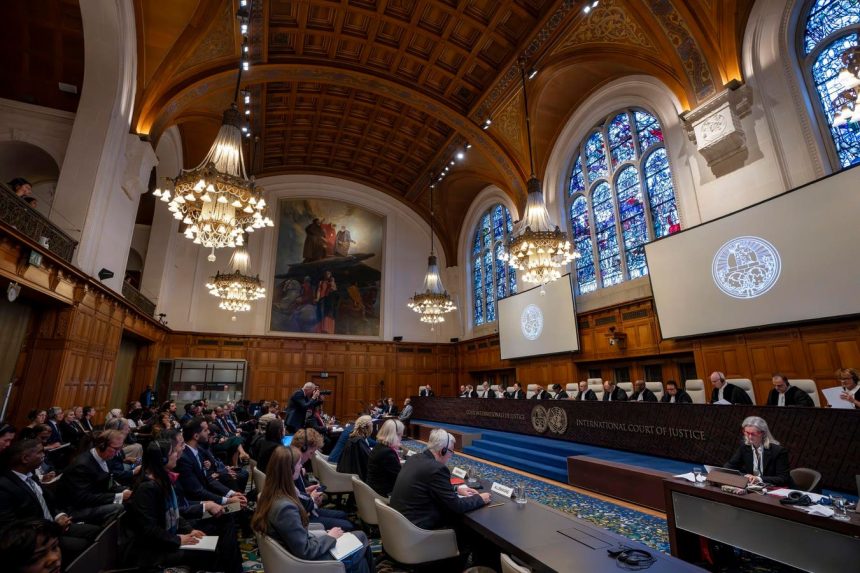The International Court of Justice (ICJ), also known as the World Court, recently concluded oral hearings concerning a pivotal advisory opinion on states’ obligations regarding climate change. This request, initiated by the UN General Assembly at the behest of Vanuatu, seeks to clarify the legal responsibilities of nations in mitigating climate change and their potential financial liabilities for contributing to its adverse effects. The ICJ, established by the UN Charter in 1945, serves as a neutral judicial body for resolving inter-state disputes. Located in The Hague, Netherlands, the ICJ operates independently from the International Criminal Court (ICC), despite their shared location. The ICJ, comprised of 15 judges elected by the UN General Assembly and Security Council, will provide a non-binding advisory opinion that could significantly influence future climate litigation and legislation. This opinion is expected to be released sometime in mid to late 2025.
The core of the UN General Assembly’s request revolves around two fundamental questions. The first seeks to define the international legal obligations of states in safeguarding the climate system and environment from anthropogenic greenhouse gas emissions, both for current and future generations. The second question delves into the legal repercussions for states whose actions or inactions have significantly harmed the climate system, specifically focusing on the consequences for states, particularly vulnerable small island developing states, as well as for present and future generations affected by climate change. The ICJ’s response to these questions will have far-reaching implications for international climate policy and action.
The oral hearings, spanning two weeks in early December 2024, provided a platform for over 100 countries and parties to present their legal arguments to the 15-judge panel, including President Nawaf Salam of Lebanon. These arguments, submitted in advance with accompanying citations, were delivered in 30-minute increments and are now available as verbatim transcripts on the Court’s website, along with the accompanying written statements. The arguments presented a clear divide between developed and developing nations regarding the interpretation of existing climate agreements and their implications for financial responsibility.
The legal arguments presented a dichotomy in perspectives, primarily centering on the interpretation of the United Nations Framework Convention on Climate Change (UNFCCC) and the Paris Agreement. Developed countries, including the United States, Australia, and Germany, invoked the principle of lex specialis, arguing that these specific treaties supersede any other international law regarding climate change. This interpretation effectively limits legal obligations to those explicitly defined within the agreements, precluding potential claims for reparations or actions beyond those already negotiated. This stance essentially argues that existing treaty frameworks sufficiently address climate change obligations, negating the need for further legal interpretations or implications.
Conversely, developing countries contended that the UNFCCC and Paris Agreement represent merely a foundation for climate action. They argued that the adverse impacts of climate change infringe upon fundamental human rights, enshrined in international common law and the Universal Declaration of Human Rights. They maintained that countries significantly contributing to climate change through fossil fuel production and greenhouse gas emissions bear a responsibility to provide reparations to vulnerable nations disproportionately affected by its consequences. This argument underscores the moral and legal imperative for developed nations, historically responsible for a larger share of emissions, to assist developing countries in adapting to and mitigating the effects of climate change.
Following the conclusion of oral arguments, four judges posed specific questions to the participating parties, requiring written responses by December 20th. Judge Sarah Cleveland (USA) inquired about the specific obligations of states with significant fossil fuel production within their jurisdictions. Judge Dire Tladi (South Africa) sought clarification on the interpretation of Article 4 of the Paris Agreement, focusing on the influence of its object and purpose. Judge Bogdan-Lucian Auresco (Romania) asked for elaboration on the legal content and relevance of the right to a clean, healthy, and sustainable environment. Judge Hilary Charlesworth (Australia) inquired about the significance of declarations made by states upon joining the UNFCCC and Paris Agreement, particularly concerning their potential impact on claims for compensation or liability related to climate change.
The answers to these questions, alongside the comprehensive body of arguments presented during the hearings, will inform the ICJ’s advisory opinion, which is anticipated to be a landmark judgment in international climate law. While non-binding, this opinion will hold significant weight in shaping future climate litigation, influencing policy development, and potentially reshaping the landscape of climate responsibility and action on a global scale. The opinion is expected to provide valuable guidance on how international law applies to climate change, potentially opening new avenues for legal action and influencing international negotiations on climate change mitigation and adaptation. The complexities surrounding the issues raised, and the comprehensive nature of the submissions received, necessitate a thorough and considered deliberation by the Court, hence the expected release timeframe of mid to late 2025.



